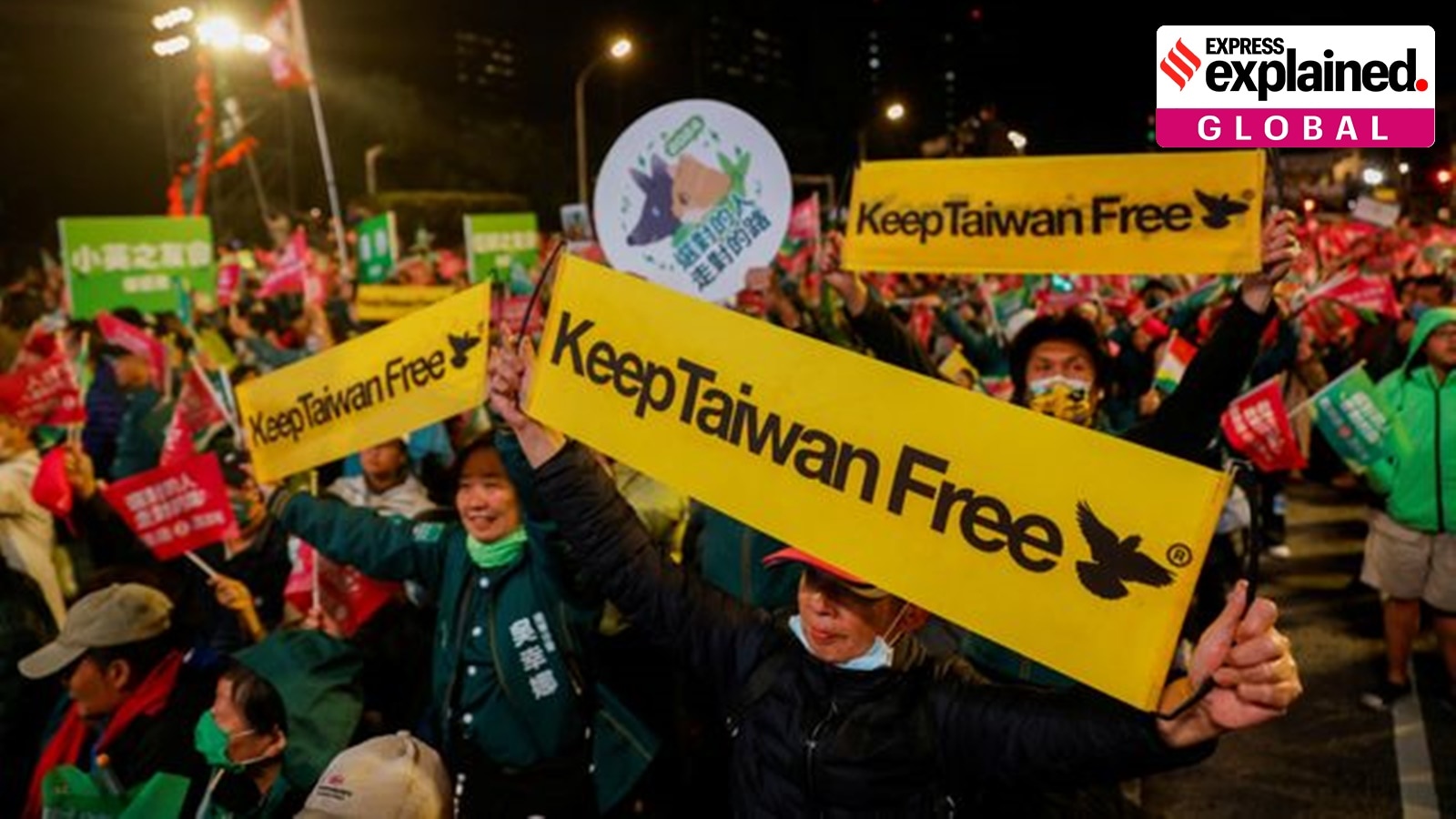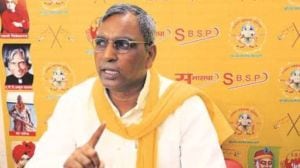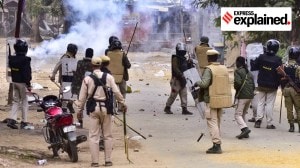Taiwan votes on January 13: Amid tensions with China, why these polls are significant
Taiwan elections: Given Taiwan's fraught relationship with China and the escalating global tensions, the outcome of these polls might be historic for the island. Here's the complete backgrounder.
 Supporters attend a campaign rally of the ruling Democratic Progressive Party (DPP) ahead of the presidential and parliamentary elections in Taipei, Taiwan January 11. (Photo: Reuters)
Supporters attend a campaign rally of the ruling Democratic Progressive Party (DPP) ahead of the presidential and parliamentary elections in Taipei, Taiwan January 11. (Photo: Reuters)On January 13, Taiwan will vote to elect its next President and legislature. Given the island’s fraught relationship with China and the escalating global tensions, the outcome of this election might be historic for Taiwan.
The election was expected to be a clear victory for the ruling Democratic Progressive Party (DPP), but has turned into a tight race with the main opposition party Kuomintang (KMT) managing a late surge.
In the previous elections, the main issues have been around whether to enhance Taiwan’s uniqueness and sovereignty or to foster better relations with China. Despite never having governed the democratic island home to 24 million people, Communist China continues to claim Taiwan as its own and has not ruled out a military invasion to achieve this. China launches fighter jets into the Taiwan Strait almost daily. Meanwhile, the United States, the de facto security guarantee for Taiwan, is intensifying military drills around the Indo-Pacific with its partners.
History between Taiwan and China
After Mao Zedong’s Communist Party seized power on the mainland in 1949, exiled Chinese nationalists led by Chiang Kai-shek established an enclave on the island of Taiwan, and proclaimed it to be the ‘Republic of China’. At first, the United States and a large section of the West backed this ‘government’. In the Cold War, the Taiwanese government in Taipei emerged as a crucial ally of the United States and took over China’s seat on the UN Security Council.
However, all that changed in 1979 when the US, as part of its efforts to normalise ties with mainland China, moved its recognition from Taipei to Beijing. Washington adopted a strategy of strategic ambiguity towards Taiwan with this adjustment, which continues till this day. Officially, the US recognises Beijing’s belief that Taiwan is a part of China under the ‘one China’ theory. However, it maintains close connections with Taiwan.
From 1949 to 1996, Kai-shek’s KMT ruled Taiwan under a de facto dictatorship but in 1996, the country held its first direct presidential election. Since then, it has undergone three peaceful transfers of power in 2000, 2008, and 2016.
Taiwan’s current President, Tsai Ing-wen of the DPP, made history in 2016 by becoming the first woman to be elected to the top office. She is constitutionally barred from running again. Tsai was known for her hard line on the island’s foreign policy, refusing to acknowledge the 1992 consensus which maintains that Taiwan is part of ‘one China.’
Tsai started a reorganisation of Taiwan’s reserve force, which is meant to support the armed forces in times of conflict, and almost quadrupled the country’s defence budget. She also increased the necessary military service period to one year. Additionally, Tsai made massive investments in Taiwan’s defence sector, building an in-house submarine and giving drone and missile development top priority.
Candidates
This time, the leading contender is Lai Ching-te, Tsai’s successor from the DPP.
Ching-te is a former physician who has occupied nearly every important position in Taiwanese politics. After serving as a lawmaker for more than ten years, he was elected mayor of Tainan, a city in the south of Taiwan. Hard-line independence advocates find Lai most appealing, although centrist voters have also shown some affection for him.
However, the DPP has issues with its reputation.While the party came up in response to the KMT’s dictatorship, after eight years in power, it is viewed as the establishment by many young people.
Ching-te’s main opponent is Hou Yu-ih of the KMT. A former police officer, Hou led Taiwan’s National Police Agency in 2006. According to a former DPP legislator, he has a “Taiwanese flavour” and was raised among street-market pork vendors in Chiayi, a southern pro-independence bastion. The KMT is hoping that he would break the party’s elitist image and win over voters who are not part of the KMT’s traditional base of immigrants from the mainland and their offspring. Hou supports holding discussions to ease tensions across the Taiwan Strait with the Communist Party.
Lastly, there is Ko Wen-je from the Taiwan People’s Party (TPP.)
Prior to running as an independent in 2014 for mayor of Taipei, Ko worked as a physician. Despite having no prior political experience, he easily defeated a KMT candidate for mayor and was re-elected until 2022. He established the Taiwan People’s Party four years ago. Presenting himself as a “rational” and “scientific” technocrat, Ko has prioritised local issues like housing and energy above ties with China.
While the DPP frames the vote as a choice between “democracy and autocracy”, and the KMT says it is a matter of “war or peace”, Ko says the election is a competition between “new politics and old forces”.
The China question
Despite the tensions, China is Taiwan’s largest commercial partner. A large number of Taiwanese have familial and commercial ties across the strait. However, surveys over time indicate a rise in the proportion of individuals who identify as Taiwanese rather than Chinese.
While they disagree on the most effective strategy, the contenders all want to ensure Taiwan’s de facto independence. While Lai prioritises closer connections with Taiwan’s allies, Hou and Ko lay greater emphasis on resuming talks with Beijing, which China broke off following President Tsai Ing-wen’s inauguration in 2016.
The Communist Party leadership of Chinese President Xi Jinping is attempting to sway the election through disinformation on social media. The party is eager to see the ruling party in Taipei overthrown and has become more assertive in its claim that democratic Taiwan is a part of China.
While China has always been a matter of concern for Taiwan, two recent events have raised the stakes.
Beijing enacted a national security law for Hong Kong in 2020, and since then, it has significantly restricted political and civil liberties. When Hong Kong was handed over to China by the British under the Sino-British Joint Declaration of 1984, Beijing had promised it “a high degree of autonomy”. After seeing how Beijing broke its word in Hong Kong, many Taiwanese are wary.
Additionally, Ukraine’s ability to defend itself against two years of Russian onslaught has galvanised Taiwanese leaders by demonstrating the ability of smaller militaries to restrict authoritarian forces.
Beijing will also be concerned by other demographic factors. Over 60% of the island’s population now identifies exclusively as Taiwanese, with 30% identifying as both Taiwanese and Chinese, and only 2.5 % as Chinese. For the first time ever, all of the presidential contenders are native Taiwanese, which means their ancestors immigrated to the island nation prior to the Chinese Civil War.
- 01
- 02
- 03
- 04
- 05






































